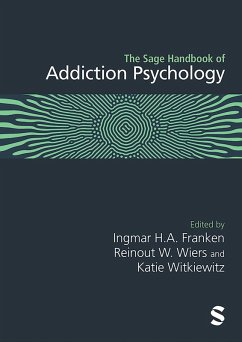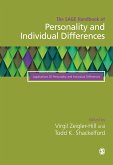The Sage Handbook of Addiction Psychology (eBook, ePUB)
Redaktion: Franken, Ingmar H. A.; Witkiewitz, Katie; Wiers, Reinout
85,95 €
85,95 €
inkl. MwSt.
Sofort per Download lieferbar

43 °P sammeln
85,95 €
Als Download kaufen

85,95 €
inkl. MwSt.
Sofort per Download lieferbar

43 °P sammeln
Jetzt verschenken
Alle Infos zum eBook verschenken
85,95 €
inkl. MwSt.
Sofort per Download lieferbar
Alle Infos zum eBook verschenken

43 °P sammeln
The Sage Handbook of Addiction Psychology (eBook, ePUB)
Redaktion: Franken, Ingmar H. A.; Witkiewitz, Katie; Wiers, Reinout
- Format: ePub
- Merkliste
- Auf die Merkliste
- Bewerten Bewerten
- Teilen
- Produkt teilen
- Produkterinnerung
- Produkterinnerung

Bitte loggen Sie sich zunächst in Ihr Kundenkonto ein oder registrieren Sie sich bei
bücher.de, um das eBook-Abo tolino select nutzen zu können.
Hier können Sie sich einloggen
Hier können Sie sich einloggen
Sie sind bereits eingeloggt. Klicken Sie auf 2. tolino select Abo, um fortzufahren.

Bitte loggen Sie sich zunächst in Ihr Kundenkonto ein oder registrieren Sie sich bei bücher.de, um das eBook-Abo tolino select nutzen zu können.
The Sage Handbook of Addiction Psychology presents a comprehensive overview of the state of the science behind the psychology of addiction, offering a crucial resource for psychologists engaged in both research and practice.
The Handbook features a distinguished international group of contributors, all renowned specialists in their respective fields and emphasizes a forward-looking perspective. Chapters delve into psychological theories of addiction and evidence-based addiction treatment, offering practical insights on the intricacies of addiction psychology.
The handbook takes a…mehr
- Geräte: eReader
- mit Kopierschutz
- eBook Hilfe
- Größe: 15.99MB
Andere Kunden interessierten sich auch für
![The SAGE Handbook of Domestic Violence (eBook, ePUB) The SAGE Handbook of Domestic Violence (eBook, ePUB)]() The SAGE Handbook of Domestic Violence (eBook, ePUB)208,95 €
The SAGE Handbook of Domestic Violence (eBook, ePUB)208,95 €![The SAGE Handbook of Domestic Violence (eBook, ePUB) The SAGE Handbook of Domestic Violence (eBook, ePUB)]() The SAGE Handbook of Domestic Violence (eBook, ePUB)208,95 €
The SAGE Handbook of Domestic Violence (eBook, ePUB)208,95 €![The SAGE Handbook of Personality and Individual Differences (eBook, ePUB) The SAGE Handbook of Personality and Individual Differences (eBook, ePUB)]() The SAGE Handbook of Personality and Individual Differences (eBook, ePUB)271,95 €
The SAGE Handbook of Personality and Individual Differences (eBook, ePUB)271,95 €![The SAGE Handbook of Industrial, Work & Organizational Psychology, 3v (eBook, ePUB) The SAGE Handbook of Industrial, Work & Organizational Psychology, 3v (eBook, ePUB)]() The SAGE Handbook of Industrial, Work & Organizational Psychology, 3v (eBook, ePUB)312,95 €
The SAGE Handbook of Industrial, Work & Organizational Psychology, 3v (eBook, ePUB)312,95 €![The SAGE Handbook of Personality and Individual Differences (eBook, ePUB) The SAGE Handbook of Personality and Individual Differences (eBook, ePUB)]() The SAGE Handbook of Personality and Individual Differences (eBook, ePUB)92,95 €
The SAGE Handbook of Personality and Individual Differences (eBook, ePUB)92,95 €![The SAGE Handbook of Personality and Individual Differences (eBook, ePUB) The SAGE Handbook of Personality and Individual Differences (eBook, ePUB)]() The SAGE Handbook of Personality and Individual Differences (eBook, ePUB)92,95 €
The SAGE Handbook of Personality and Individual Differences (eBook, ePUB)92,95 €![The SAGE Handbook of Personality and Individual Differences (eBook, ePUB) The SAGE Handbook of Personality and Individual Differences (eBook, ePUB)]() The SAGE Handbook of Personality and Individual Differences (eBook, ePUB)92,95 €
The SAGE Handbook of Personality and Individual Differences (eBook, ePUB)92,95 €-
-
-
The Sage Handbook of Addiction Psychology presents a comprehensive overview of the state of the science behind the psychology of addiction, offering a crucial resource for psychologists engaged in both research and practice.
The Handbook features a distinguished international group of contributors, all renowned specialists in their respective fields and emphasizes a forward-looking perspective. Chapters delve into psychological theories of addiction and evidence-based addiction treatment, offering practical insights on the intricacies of addiction psychology.
The handbook takes a holistic approach by incorporating neighbouring fields traditionally outside of psychology; it explores economics, genetics, public health, neurobiology, computer science, and sociology, recognizing that psychology and individual-centered perspectives are just one facet of addiction. This multifaceted approach ensures that readers gain a broad understanding of the psychology of addiction, fostering a comprehensive and nuanced comprehension of this complex subject.
With Substance Use Disorders ranking among the most prevalent mental health concerns globally, this handbook, designed from the ground up for students and researchers, is an essential resource for those seeking a deep understanding of the field of addiction psychology.
Part 1. Background, including history and epidemiology.
PART 2. Vulnerability, including psychological, environmental, and biological factors.
PART 3 Interventions
PART 4 Specific addictions
PART 5 Future directions
Hinweis: Dieser Artikel kann nur an eine deutsche Lieferadresse ausgeliefert werden.
The Handbook features a distinguished international group of contributors, all renowned specialists in their respective fields and emphasizes a forward-looking perspective. Chapters delve into psychological theories of addiction and evidence-based addiction treatment, offering practical insights on the intricacies of addiction psychology.
The handbook takes a holistic approach by incorporating neighbouring fields traditionally outside of psychology; it explores economics, genetics, public health, neurobiology, computer science, and sociology, recognizing that psychology and individual-centered perspectives are just one facet of addiction. This multifaceted approach ensures that readers gain a broad understanding of the psychology of addiction, fostering a comprehensive and nuanced comprehension of this complex subject.
With Substance Use Disorders ranking among the most prevalent mental health concerns globally, this handbook, designed from the ground up for students and researchers, is an essential resource for those seeking a deep understanding of the field of addiction psychology.
Part 1. Background, including history and epidemiology.
PART 2. Vulnerability, including psychological, environmental, and biological factors.
PART 3 Interventions
PART 4 Specific addictions
PART 5 Future directions
Dieser Download kann aus rechtlichen Gründen nur mit Rechnungsadresse in A, D ausgeliefert werden.
Hinweis: Dieser Artikel kann nur an eine deutsche Lieferadresse ausgeliefert werden.
Produktdetails
- Produktdetails
- Verlag: SAGE Publications
- Erscheinungstermin: 5. Oktober 2024
- Englisch
- ISBN-13: 9781529678697
- Artikelnr.: 70529681
- Verlag: SAGE Publications
- Erscheinungstermin: 5. Oktober 2024
- Englisch
- ISBN-13: 9781529678697
- Artikelnr.: 70529681
- Herstellerkennzeichnung Die Herstellerinformationen sind derzeit nicht verfügbar.
Ingmar Franken is a full professor of clinical psychology at Erasmus University Rotterdam, the Netherlands, where he directs the Center for Substance Use and Addiction Research (CESAR). With a "From Lab to Society" ethos, he emphasizes the integration of basic experimental research and clinical practice. Franken employs a variety of methodologies to achieve this goal, ranging from cognitive neuroscience techniques such as fMRI and EEG to longitudinal cohort studies. In particular, he is involved in several large longitudinal neuroscience initiatives, including the Generation R and Growing Up Together in Society (GUTS) cohort studies in Rotterdam. His current focus is on understanding the neurocognitive underpinnings of adolescent substance use and elucidating the causes and consequences of addiction. He has successfully supervised 27 Ph.D. students and has authored three books, over 200 peer-reviewed publications, and numerous book chapters. His expertise is sought worldwide, with more than 100 presentations and invited talks at conferences, universities, and research institutions around the world. Reinout Wiers is Professor of Developmental Psychopathology, Department of Psychology, University of Amsterdam, where he leads the Addiction Development and Psychopathology (ADAPT) Lab. He is (co)director of the University of Amsterdam's Centre for Urban Mental Health. He is internationally known for his work on assessing and changing implicit cognitive processes in addiction. He has published over 400 international papers and many book-chapters and three books. With Alan Stacy, he edited the handbook of implicit cognition and addiction (SAGE, 2005). He received the prestigious VIDI (2002) and VICI (2008) research grants from the Dutch National Science Foundation (N.W.O.) for research on implicit cognition and addiction, and has been part of several European and international research consortia. Katie Witkiewitz is a Distinguished Professor of Psychology and the Director of the Center on Alcohol, Substance use, And Addictions at the University of New Mexico. Her research examines treatment of substance use disorder, with an emphasis on reducing human suffering, harm reduction, precision medicine, and supporting recovery. Professor Witkiewitz is also a licensed clinical psychologist and has worked extensively on the development, evaluation, and implementation of mindfulness-based treatments for substance use disorder. She serves on the United States National Advisory Council on Alcohol Abuse and Alcoholism and on the Board of Scientific Counselors for the National Institute on Drug Abuse. Professor Witkiewitz is currently Editor of Psychology of Addictive Behaviors, and serves on the editorial boards of Substance Use and Misuse, Alcohol and Alcoholism, Annual Reviews: Clinical Psychology, and Journal of Psychopathology and Clinical Science. Her research has been supported by multiple grants from the National Institutes of Health, totaling over $90 million in research funding since 2004. She has authored 6 books and over 300 peer-reviewed publications, and has given over 100 presentations and invited talks.
Editors¿ Introduction - Ingmar H.A. Franken, Reinout Wiers, Katie
Witkiewitz
PART 1: Background
Chapter 1: The history of addiction concepts: from 'addiction' to
'addictions' - Alex Mold
Chapter 2: Addiction, brain disease, and free will - Matt Field
Chapter 3: The epidemiology of substance use and substance use disorder -
Deborah Hasin, Julia M. Bujno, Caroline G. Wisell
Chapter 4: The epidemiology of behavioral addictions - Biljana Gjoneska,
Beáta Bothe, Marc N. Potenza, Attila Szabó, Zsolt Demetrovics
Chapter 5: The developmental epidemiology of substance use and disorder -
Andrea Hussong, Amanda K. Haik, Adrianna N. Richards
Chapter 6: Health equity considerations for drug and alcohol addiction
research and treatment - Angela Haeny, Caravella McCuistian, Lesia M.
Ruglass, Kathy Burlew
PART 2: Vulnerability & Mechanisms
Chapter 7: Contemporary psychological theories of addiction - Marvin Krank,
Maya Pilin
Chapter 8: Cognitive models of addiction - Andrew Waters, Mehmet Sofuoglu
Chapter 9: Behavioral economics of addiction: A reinforcer pathology
approach - Warren Bickel, Rafaela M. Fontes, Daniel A.R. Cabral, Anthony N.
Nist, Roberta Freitas-Lemos
Chapter 10: Stress and addictive disorders: Drug- and stressor-related
effects on stress biological and psychological response - Rajita Sinha,
Morgan Pearlman, Rajita Sinha
Chapter 11:Trauma and addiction - Willie Langenland
Chapter 12: The role of impulsivity in addictive behavior - Michiel Boog,
Ingmar Franken
Chapter 13: Early life risk factors of substance abuse and substance use
disorder - Hanan El Marroun
Chapter 14: Adolescent development and vulnerability for addiction -
Natalie Castellanos-Ryan, Nina Pocuca, Margot Peeters
Chapter 15: Beyond the individual: Considering contextual factors in
addiction psychology - David I.K. Moniz-Lewis, Hannah A. Carlon, Hanna M.
Hebden, Felicia R. Tuchman, Katie Witkiewitz
Chapter 16: The genetic basis of addiction - Karin J.H. Verweij, Joelle A.
Pasman, Eske M. Derks, & Zachary F. Gerring
Chapter 17: Mapping brain structure and function in addiction: A narrative
review of neuroimaging studies - Valentina Lorenzetti, Ethan Murphy,
Anastasia Paloubis, Chao Suo, Govinda Poudel, Hannah Thomson
Chapter 18: The relevance of animal studies for human addiction - Serge
Ahmed
PART 3: Interventions
Chapter 19: Preventing substance use - Gilbert Botvin, Kenneth W. Griffin
Chapter 20: Public health interventions for addiction - Jurgen Rehm
Chapter 21: Using Brief Motivational Interviewing as an Early Intervention
for Reducing Risk of Substance Use Problems and Substance Use Disorder in
Young People - Leanne Hides
Chapter 22: Psychological interventions for addictive behaviors - Katie
Witkiewitz
Chapter 23: Care for chronic patients using harm reduction strategies -
Henri-Jean Aubin
Chapter 24: Cognitive Bias Modification as add-on to the treatment of
substance use disorders - Charlotte E. Wittekind, Mike Rinck, Reinout W.
Wiers
PART 4: Specific Addictions
Chapter 25: Alcohol use disorder - Shannon N. Speed, Lorenzo Leggio
Chapter 26: Tobacco smoking addiction and nicotine dependence - Sharon Cox
Chapter 27: Opioid Use and Misuse - Kevin Vowles, G. Cameron Coleman, Mark
A. Ilgen
Chapter 28: Stimulant use disorders - Antonio Verdejo-Garcia, Gloria
Garcia-Fernandez
Chapter 29: The epidemiology of cannabis use - Alvaro Castillo-Carniglia,
Diego Piñol-Arriagada
Chapter 30: Gambling addiction - Ellen Flynn, Luke Clarke
Chapter 31: Gaming disorder and other online addictive behaviors - Annika
Brandtner, Matthias Brand
Chapter 32: Eating addiction - Adrian Meule
PART 5: Future directions
Chapter 33: Value and potential of network models for conceptualizing,
assessing, and treating addiction and co-occurring disorders - Marilyn
Piccirillo
Chapter 34: Identity and Addiction - Kevin S. Montes, Anita Kapila-Ramirez,
Juana Hernandez Jaime, Sheena Adolphus, Maria Delgado
Chapter 35: To flourish or flounder: The relation between meaning in life
and addiction - Brian Ostafin, Marcel Näther
Chapter 36: Psychedelic therapy in the treatment of addiction - Joshua
Watt, Joel Hoffman, Paul S. Haber, Kirsten C. Morley
Chapter 37: Neuromodulation technologies for substance use disorders - Afra
Souki, Ghazaleh Soleimani, Colleen Hanlon, Hamed Ekhtiari
Chapter 38: Artificial intelligence in substance use research - Emmanuel
Kuntsche, Maree Patsouras, Zhen He, Benjamin Riordan
Witkiewitz
PART 1: Background
Chapter 1: The history of addiction concepts: from 'addiction' to
'addictions' - Alex Mold
Chapter 2: Addiction, brain disease, and free will - Matt Field
Chapter 3: The epidemiology of substance use and substance use disorder -
Deborah Hasin, Julia M. Bujno, Caroline G. Wisell
Chapter 4: The epidemiology of behavioral addictions - Biljana Gjoneska,
Beáta Bothe, Marc N. Potenza, Attila Szabó, Zsolt Demetrovics
Chapter 5: The developmental epidemiology of substance use and disorder -
Andrea Hussong, Amanda K. Haik, Adrianna N. Richards
Chapter 6: Health equity considerations for drug and alcohol addiction
research and treatment - Angela Haeny, Caravella McCuistian, Lesia M.
Ruglass, Kathy Burlew
PART 2: Vulnerability & Mechanisms
Chapter 7: Contemporary psychological theories of addiction - Marvin Krank,
Maya Pilin
Chapter 8: Cognitive models of addiction - Andrew Waters, Mehmet Sofuoglu
Chapter 9: Behavioral economics of addiction: A reinforcer pathology
approach - Warren Bickel, Rafaela M. Fontes, Daniel A.R. Cabral, Anthony N.
Nist, Roberta Freitas-Lemos
Chapter 10: Stress and addictive disorders: Drug- and stressor-related
effects on stress biological and psychological response - Rajita Sinha,
Morgan Pearlman, Rajita Sinha
Chapter 11:Trauma and addiction - Willie Langenland
Chapter 12: The role of impulsivity in addictive behavior - Michiel Boog,
Ingmar Franken
Chapter 13: Early life risk factors of substance abuse and substance use
disorder - Hanan El Marroun
Chapter 14: Adolescent development and vulnerability for addiction -
Natalie Castellanos-Ryan, Nina Pocuca, Margot Peeters
Chapter 15: Beyond the individual: Considering contextual factors in
addiction psychology - David I.K. Moniz-Lewis, Hannah A. Carlon, Hanna M.
Hebden, Felicia R. Tuchman, Katie Witkiewitz
Chapter 16: The genetic basis of addiction - Karin J.H. Verweij, Joelle A.
Pasman, Eske M. Derks, & Zachary F. Gerring
Chapter 17: Mapping brain structure and function in addiction: A narrative
review of neuroimaging studies - Valentina Lorenzetti, Ethan Murphy,
Anastasia Paloubis, Chao Suo, Govinda Poudel, Hannah Thomson
Chapter 18: The relevance of animal studies for human addiction - Serge
Ahmed
PART 3: Interventions
Chapter 19: Preventing substance use - Gilbert Botvin, Kenneth W. Griffin
Chapter 20: Public health interventions for addiction - Jurgen Rehm
Chapter 21: Using Brief Motivational Interviewing as an Early Intervention
for Reducing Risk of Substance Use Problems and Substance Use Disorder in
Young People - Leanne Hides
Chapter 22: Psychological interventions for addictive behaviors - Katie
Witkiewitz
Chapter 23: Care for chronic patients using harm reduction strategies -
Henri-Jean Aubin
Chapter 24: Cognitive Bias Modification as add-on to the treatment of
substance use disorders - Charlotte E. Wittekind, Mike Rinck, Reinout W.
Wiers
PART 4: Specific Addictions
Chapter 25: Alcohol use disorder - Shannon N. Speed, Lorenzo Leggio
Chapter 26: Tobacco smoking addiction and nicotine dependence - Sharon Cox
Chapter 27: Opioid Use and Misuse - Kevin Vowles, G. Cameron Coleman, Mark
A. Ilgen
Chapter 28: Stimulant use disorders - Antonio Verdejo-Garcia, Gloria
Garcia-Fernandez
Chapter 29: The epidemiology of cannabis use - Alvaro Castillo-Carniglia,
Diego Piñol-Arriagada
Chapter 30: Gambling addiction - Ellen Flynn, Luke Clarke
Chapter 31: Gaming disorder and other online addictive behaviors - Annika
Brandtner, Matthias Brand
Chapter 32: Eating addiction - Adrian Meule
PART 5: Future directions
Chapter 33: Value and potential of network models for conceptualizing,
assessing, and treating addiction and co-occurring disorders - Marilyn
Piccirillo
Chapter 34: Identity and Addiction - Kevin S. Montes, Anita Kapila-Ramirez,
Juana Hernandez Jaime, Sheena Adolphus, Maria Delgado
Chapter 35: To flourish or flounder: The relation between meaning in life
and addiction - Brian Ostafin, Marcel Näther
Chapter 36: Psychedelic therapy in the treatment of addiction - Joshua
Watt, Joel Hoffman, Paul S. Haber, Kirsten C. Morley
Chapter 37: Neuromodulation technologies for substance use disorders - Afra
Souki, Ghazaleh Soleimani, Colleen Hanlon, Hamed Ekhtiari
Chapter 38: Artificial intelligence in substance use research - Emmanuel
Kuntsche, Maree Patsouras, Zhen He, Benjamin Riordan
Editors¿ Introduction - Ingmar H.A. Franken, Reinout Wiers, Katie
Witkiewitz
PART 1: Background
Chapter 1: The history of addiction concepts: from 'addiction' to
'addictions' - Alex Mold
Chapter 2: Addiction, brain disease, and free will - Matt Field
Chapter 3: The epidemiology of substance use and substance use disorder -
Deborah Hasin, Julia M. Bujno, Caroline G. Wisell
Chapter 4: The epidemiology of behavioral addictions - Biljana Gjoneska,
Beáta Bothe, Marc N. Potenza, Attila Szabó, Zsolt Demetrovics
Chapter 5: The developmental epidemiology of substance use and disorder -
Andrea Hussong, Amanda K. Haik, Adrianna N. Richards
Chapter 6: Health equity considerations for drug and alcohol addiction
research and treatment - Angela Haeny, Caravella McCuistian, Lesia M.
Ruglass, Kathy Burlew
PART 2: Vulnerability & Mechanisms
Chapter 7: Contemporary psychological theories of addiction - Marvin Krank,
Maya Pilin
Chapter 8: Cognitive models of addiction - Andrew Waters, Mehmet Sofuoglu
Chapter 9: Behavioral economics of addiction: A reinforcer pathology
approach - Warren Bickel, Rafaela M. Fontes, Daniel A.R. Cabral, Anthony N.
Nist, Roberta Freitas-Lemos
Chapter 10: Stress and addictive disorders: Drug- and stressor-related
effects on stress biological and psychological response - Rajita Sinha,
Morgan Pearlman, Rajita Sinha
Chapter 11:Trauma and addiction - Willie Langenland
Chapter 12: The role of impulsivity in addictive behavior - Michiel Boog,
Ingmar Franken
Chapter 13: Early life risk factors of substance abuse and substance use
disorder - Hanan El Marroun
Chapter 14: Adolescent development and vulnerability for addiction -
Natalie Castellanos-Ryan, Nina Pocuca, Margot Peeters
Chapter 15: Beyond the individual: Considering contextual factors in
addiction psychology - David I.K. Moniz-Lewis, Hannah A. Carlon, Hanna M.
Hebden, Felicia R. Tuchman, Katie Witkiewitz
Chapter 16: The genetic basis of addiction - Karin J.H. Verweij, Joelle A.
Pasman, Eske M. Derks, & Zachary F. Gerring
Chapter 17: Mapping brain structure and function in addiction: A narrative
review of neuroimaging studies - Valentina Lorenzetti, Ethan Murphy,
Anastasia Paloubis, Chao Suo, Govinda Poudel, Hannah Thomson
Chapter 18: The relevance of animal studies for human addiction - Serge
Ahmed
PART 3: Interventions
Chapter 19: Preventing substance use - Gilbert Botvin, Kenneth W. Griffin
Chapter 20: Public health interventions for addiction - Jurgen Rehm
Chapter 21: Using Brief Motivational Interviewing as an Early Intervention
for Reducing Risk of Substance Use Problems and Substance Use Disorder in
Young People - Leanne Hides
Chapter 22: Psychological interventions for addictive behaviors - Katie
Witkiewitz
Chapter 23: Care for chronic patients using harm reduction strategies -
Henri-Jean Aubin
Chapter 24: Cognitive Bias Modification as add-on to the treatment of
substance use disorders - Charlotte E. Wittekind, Mike Rinck, Reinout W.
Wiers
PART 4: Specific Addictions
Chapter 25: Alcohol use disorder - Shannon N. Speed, Lorenzo Leggio
Chapter 26: Tobacco smoking addiction and nicotine dependence - Sharon Cox
Chapter 27: Opioid Use and Misuse - Kevin Vowles, G. Cameron Coleman, Mark
A. Ilgen
Chapter 28: Stimulant use disorders - Antonio Verdejo-Garcia, Gloria
Garcia-Fernandez
Chapter 29: The epidemiology of cannabis use - Alvaro Castillo-Carniglia,
Diego Piñol-Arriagada
Chapter 30: Gambling addiction - Ellen Flynn, Luke Clarke
Chapter 31: Gaming disorder and other online addictive behaviors - Annika
Brandtner, Matthias Brand
Chapter 32: Eating addiction - Adrian Meule
PART 5: Future directions
Chapter 33: Value and potential of network models for conceptualizing,
assessing, and treating addiction and co-occurring disorders - Marilyn
Piccirillo
Chapter 34: Identity and Addiction - Kevin S. Montes, Anita Kapila-Ramirez,
Juana Hernandez Jaime, Sheena Adolphus, Maria Delgado
Chapter 35: To flourish or flounder: The relation between meaning in life
and addiction - Brian Ostafin, Marcel Näther
Chapter 36: Psychedelic therapy in the treatment of addiction - Joshua
Watt, Joel Hoffman, Paul S. Haber, Kirsten C. Morley
Chapter 37: Neuromodulation technologies for substance use disorders - Afra
Souki, Ghazaleh Soleimani, Colleen Hanlon, Hamed Ekhtiari
Chapter 38: Artificial intelligence in substance use research - Emmanuel
Kuntsche, Maree Patsouras, Zhen He, Benjamin Riordan
Witkiewitz
PART 1: Background
Chapter 1: The history of addiction concepts: from 'addiction' to
'addictions' - Alex Mold
Chapter 2: Addiction, brain disease, and free will - Matt Field
Chapter 3: The epidemiology of substance use and substance use disorder -
Deborah Hasin, Julia M. Bujno, Caroline G. Wisell
Chapter 4: The epidemiology of behavioral addictions - Biljana Gjoneska,
Beáta Bothe, Marc N. Potenza, Attila Szabó, Zsolt Demetrovics
Chapter 5: The developmental epidemiology of substance use and disorder -
Andrea Hussong, Amanda K. Haik, Adrianna N. Richards
Chapter 6: Health equity considerations for drug and alcohol addiction
research and treatment - Angela Haeny, Caravella McCuistian, Lesia M.
Ruglass, Kathy Burlew
PART 2: Vulnerability & Mechanisms
Chapter 7: Contemporary psychological theories of addiction - Marvin Krank,
Maya Pilin
Chapter 8: Cognitive models of addiction - Andrew Waters, Mehmet Sofuoglu
Chapter 9: Behavioral economics of addiction: A reinforcer pathology
approach - Warren Bickel, Rafaela M. Fontes, Daniel A.R. Cabral, Anthony N.
Nist, Roberta Freitas-Lemos
Chapter 10: Stress and addictive disorders: Drug- and stressor-related
effects on stress biological and psychological response - Rajita Sinha,
Morgan Pearlman, Rajita Sinha
Chapter 11:Trauma and addiction - Willie Langenland
Chapter 12: The role of impulsivity in addictive behavior - Michiel Boog,
Ingmar Franken
Chapter 13: Early life risk factors of substance abuse and substance use
disorder - Hanan El Marroun
Chapter 14: Adolescent development and vulnerability for addiction -
Natalie Castellanos-Ryan, Nina Pocuca, Margot Peeters
Chapter 15: Beyond the individual: Considering contextual factors in
addiction psychology - David I.K. Moniz-Lewis, Hannah A. Carlon, Hanna M.
Hebden, Felicia R. Tuchman, Katie Witkiewitz
Chapter 16: The genetic basis of addiction - Karin J.H. Verweij, Joelle A.
Pasman, Eske M. Derks, & Zachary F. Gerring
Chapter 17: Mapping brain structure and function in addiction: A narrative
review of neuroimaging studies - Valentina Lorenzetti, Ethan Murphy,
Anastasia Paloubis, Chao Suo, Govinda Poudel, Hannah Thomson
Chapter 18: The relevance of animal studies for human addiction - Serge
Ahmed
PART 3: Interventions
Chapter 19: Preventing substance use - Gilbert Botvin, Kenneth W. Griffin
Chapter 20: Public health interventions for addiction - Jurgen Rehm
Chapter 21: Using Brief Motivational Interviewing as an Early Intervention
for Reducing Risk of Substance Use Problems and Substance Use Disorder in
Young People - Leanne Hides
Chapter 22: Psychological interventions for addictive behaviors - Katie
Witkiewitz
Chapter 23: Care for chronic patients using harm reduction strategies -
Henri-Jean Aubin
Chapter 24: Cognitive Bias Modification as add-on to the treatment of
substance use disorders - Charlotte E. Wittekind, Mike Rinck, Reinout W.
Wiers
PART 4: Specific Addictions
Chapter 25: Alcohol use disorder - Shannon N. Speed, Lorenzo Leggio
Chapter 26: Tobacco smoking addiction and nicotine dependence - Sharon Cox
Chapter 27: Opioid Use and Misuse - Kevin Vowles, G. Cameron Coleman, Mark
A. Ilgen
Chapter 28: Stimulant use disorders - Antonio Verdejo-Garcia, Gloria
Garcia-Fernandez
Chapter 29: The epidemiology of cannabis use - Alvaro Castillo-Carniglia,
Diego Piñol-Arriagada
Chapter 30: Gambling addiction - Ellen Flynn, Luke Clarke
Chapter 31: Gaming disorder and other online addictive behaviors - Annika
Brandtner, Matthias Brand
Chapter 32: Eating addiction - Adrian Meule
PART 5: Future directions
Chapter 33: Value and potential of network models for conceptualizing,
assessing, and treating addiction and co-occurring disorders - Marilyn
Piccirillo
Chapter 34: Identity and Addiction - Kevin S. Montes, Anita Kapila-Ramirez,
Juana Hernandez Jaime, Sheena Adolphus, Maria Delgado
Chapter 35: To flourish or flounder: The relation between meaning in life
and addiction - Brian Ostafin, Marcel Näther
Chapter 36: Psychedelic therapy in the treatment of addiction - Joshua
Watt, Joel Hoffman, Paul S. Haber, Kirsten C. Morley
Chapter 37: Neuromodulation technologies for substance use disorders - Afra
Souki, Ghazaleh Soleimani, Colleen Hanlon, Hamed Ekhtiari
Chapter 38: Artificial intelligence in substance use research - Emmanuel
Kuntsche, Maree Patsouras, Zhen He, Benjamin Riordan







